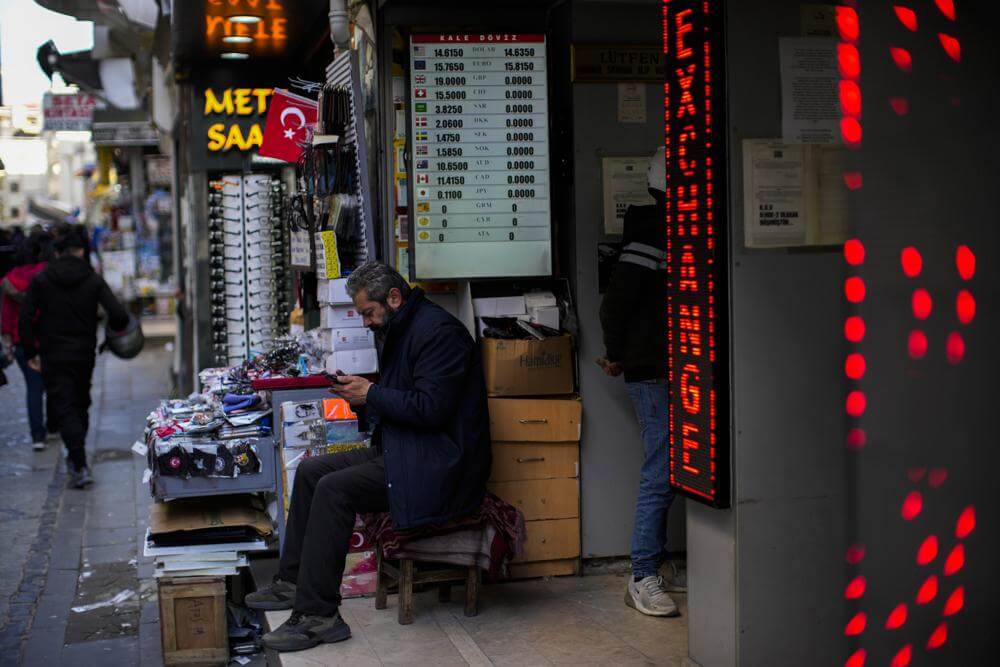Turkey’s central bank slashed interest rates for the fifth time since last year despite inflation rising to a 24-year high of roughly 80%. The Central Bank on Thursday cut its main interest rate by 100 basis points (bp) from 14% to 13%.
The bank said in a statement that despite a rise in global inflation levels as a result of supply chain disruptions due to geopolitical tensions, there is a “loss of momentum” in economic activities across Turkey, and the process of disinflation has gained momentum.
“Accordingly, the [Monetary Policy] Committee has decided to reduce the policy rate by 100 basis points, and has assessed that the updated level of policy rate is adequate under the current outlook,” it announced.
🇹🇷 Turkey has - against conventional economic wisdom - cut its interest rates once again, despite inflation hitting 80%; a 24 year high.
— TLDR News EU (@TLDRNewsEU) August 18, 2022
The Monetary Policy Committee of Turkey's central bank announced today that the benchmark rate will be cut to 13% (from 14%). pic.twitter.com/Qi0eFoS2Pm
The bank suggested that reduced economic activity could bring down inflation levels and that the rate cut is to ensure that the economy remains stable despite a downturn.
“This would create a viable foundation for investment, production and employment to continue growing in a healthy and sustainable way,” the statement read.
“President Erdogan is the world's first practical modern monetary theorist,” says @LHSummers when reacting to Turkey's interest rate cut.
— Bloomberg TV (@BloombergTV) August 18, 2022
The decision by Turkey’s central bank to cut interest rates against a backdrop of soaring inflation surprised many https://t.co/zt9D6KlblO pic.twitter.com/xmobg9QXg1
However, investors and markets reacted negatively to the latest round of rate cuts. Analysts were reportedly shocked by the central bank’s move, as they were expecting the bank to keep the rate unchanged. An analyst at an American asset management company told CNBC that it was “another idiotic move” amid soaring inflation.
The policy of lowering interest rates, also known as monetary easing, can temporarily make credit more easily available and makes borrowing much easier for businesses, which in turn could lead to greater investment. However, if monetary easing policies remain in place for too long, it can also lead to higher levels of inflation.
source: tradingeconomics.com
Turkey currently has one of the world’s highest inflation rates. In July, annual inflation rose to 79.6%, the highest in 24 years.
According to conventional monetary policy, central banks raise interest rates when there is a rise in inflation, thereby encouraging consumers to spend less and save more, ultimately reducing the circulation of money.
If you thought 80 percent inflation would persuade Erdogan to return to economic reality, think again
— Peter S. Goodman (@petersgoodman) August 18, 2022
https://t.co/xdr8bv3PYB
However, Turkish President Recep Tayyip Erdoğan has insisted that cutting interest rates will not affect inflation and will simultaneously spur more economic activity. He has cited religious objections against interest rates and cited quotes from the Quran to justify his government’s actions.
Yet, rate cuts have not spurred Turkey’s economy. Inflation has hit record levels since the central bank began slashing rates in September 2021. Inflation was at 21% in November, 36% in December, and crossed 50% in March. Moreover, the value of the lira has crashed to historic lows against the United States dollar (USD).

In December 2021, the lira’s value collapsed by 50% to 15.5 against the USD and the trend continued into 2022. The lira was trading at 17.9 to the USD on August 17, and following the latest interest rate cut, its value crashed by 0.9% to 18.
In conjunction with rising inflation, COVID-19-induced shocks, and the Russia-Ukraine war, living costs in Turkey have reached unsustainable levels. Food inflation, which was already at record highs, reached 93.7% in July, seven times higher than the OECD average. Energy and housing prices have also risen dramatically.

